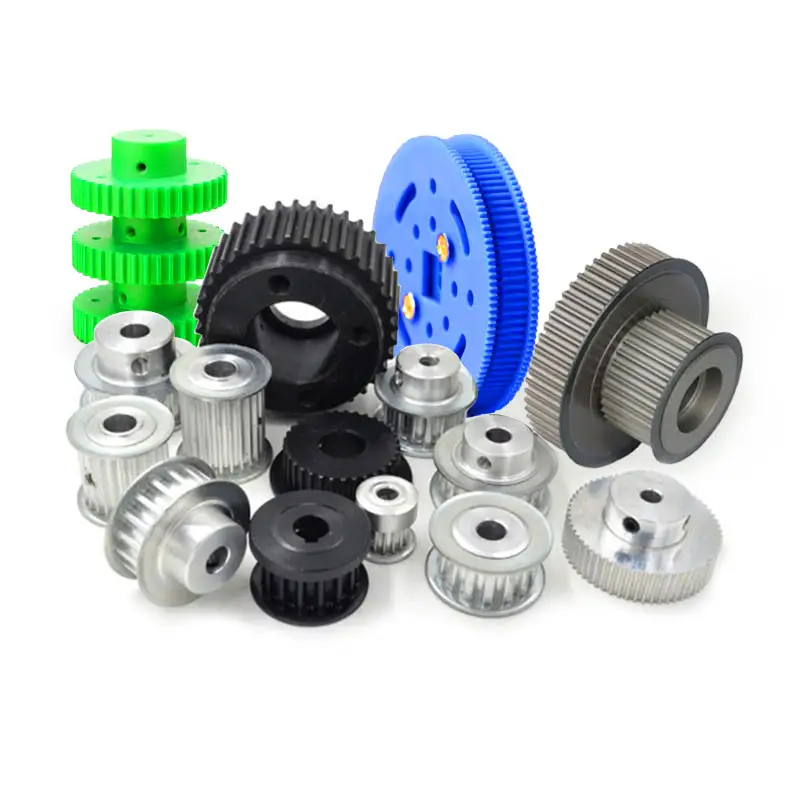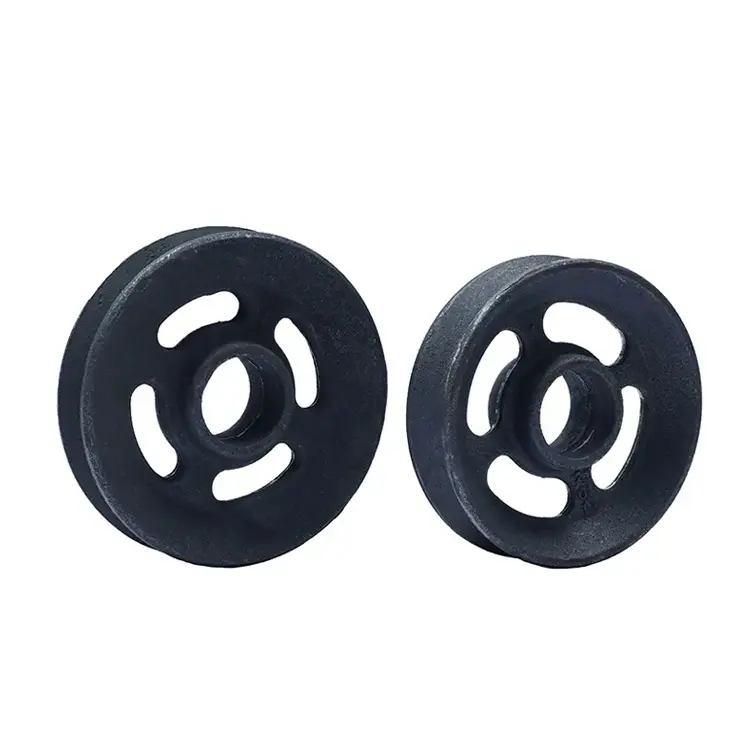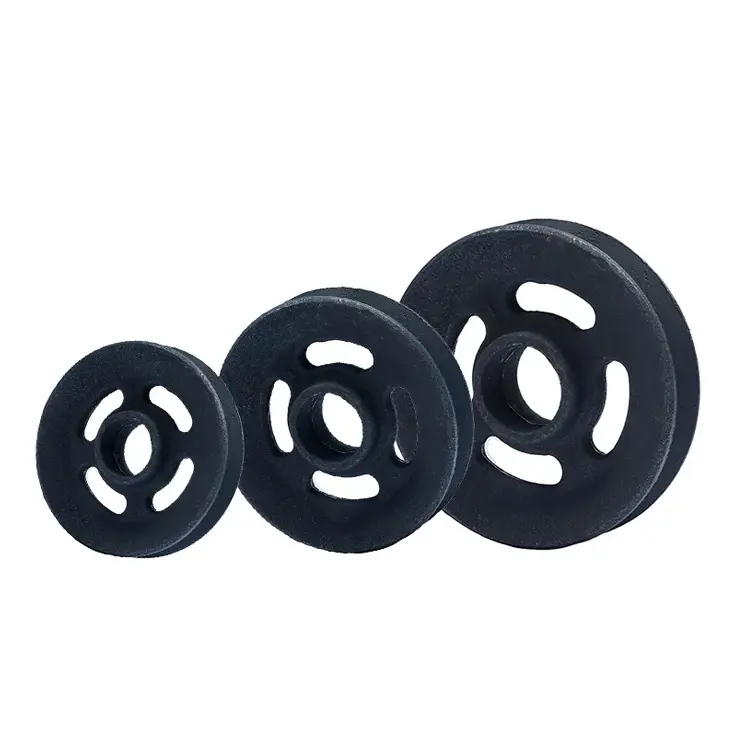Product Description
Product Description
· European standards :
a) V-belt pulley for taper bushing: SPZ, SPA, SPB, SPC
b) Adjustable speed V-belt pulleys and variable speed pulleys
c) Flat belt pulleys and conveyor belt pulleys
· Bore: Pilot bore, finish bore, taper bore, and bore for QD bushing
· Parts can be made according to drawings or samples
Detailed Photos
Product Parameters
Certifications
We have got many patent certifacates and authorizations for our casting parts.
Packaging & Shipping
Normally we pack the goods with plastic film and wooden pallet, if you have any special requests feel free to advise us.
Company Profile
HangZhou CHINAMFG Machinery Equipment Co., Ltd. was established on February 1st, 2018. It is located at No. 27, Xihu (West Lake) Dis.shao Avenue, South China Advanced Equipment Park, Xihu (West Lake) Dis. District, HangZhou City, ZheJiang Province China. It covers an area of 40,000 square CHINAMFG and a total of 27,000 square CHINAMFG of workshops, with a total investment of 120 million RMB. So far, there are more than 140 employees, more than 100 workshop workers, 3 senior engineers, 5 quality inspectors, 3 purchasing personnel, and more than 20 persons of all functional departments. The predecessor of the company was HangZhou Zhuwang Machinery Equipment Co., Ltd., which was established on September 26th, 2014.
The company is equipped with a set of fully automatic double-head static pressure casting production line equipment, sand mold size 1200*1000*250/250, a total of 202 sand boxes, with a set of 2*3tons electric CHINAMFG and a set of 2*2tons electric furnace, a set of 120-ton sand processing equipment, realizes automatic operation of casting production, and can produce 5,000 tons of various castings every month, and can produce castings with specifications of 5-200 kg.
The company is specializing in producing and selling castings of various specifications, such as: precision castings, auto parts castings, mechanical castings, valve castings, etc. Our company’s product quality is high-quality, and we always adhere to and implement the “quality is the foundation of enterprise survival, and provide users with satisfactory products and services are our CHINAMFG pursuit “quality policy.
The company’s products are all in line with the national standard (GB), with rich varieties and complete specifications. They are widely used in petroleum, chemical, electric power, boiler, ship, machinery and other industries. They have been sold around over the country and have been well received by many customers.
After Sales Service
For after-sale stage, our service team always keep close contact with you and always stand by at your service. Our warranty is 12 months after delivery. If there is any defect about our products and our service, please keep us informed. We will deal with them unconditionally.
FAQ
1) What is your main product?
Our major products are V-belt pulleys, manhole covers and types of casting parts.
2) Do you have MOQ for your product?
Normally our MOQ is 1*20 feet container, but if you want to make some trial orders, feel free to contact us.
3) How about your delivery time?
In hot season it is about 1 month, in slack season it is only about 15 workdays.
4) What is your payment term?
T/T, L/C, Western Union
5) Can you send me a price list?
Of course, pls contact us and get it.
6) Can you provide samples?
Sure, free samples will be provided, just contact us.
/* March 10, 2571 17:59:20 */!function(){function s(e,r){var a,o={};try{e&&e.split(“,”).forEach(function(e,t){e&&(a=e.match(/(.*?):(.*)$/))&&1
| Certification: | ISO |
|---|---|
| Pulley Sizes: | Type A |
| Manufacturing Process: | Casting |
| Samples: |
US$ 50/Piece
1 Piece(Min.Order) | Order Sample |
|---|
| Customization: |
Available
| Customized Request |
|---|
.shipping-cost-tm .tm-status-off{background: none;padding:0;color: #1470cc}
|
Shipping Cost:
Estimated freight per unit. |
about shipping cost and estimated delivery time. |
|---|
| Payment Method: |
|
|---|---|
|
Initial Payment Full Payment |
| Currency: | US$ |
|---|
| Return&refunds: | You can apply for a refund up to 30 days after receipt of the products. |
|---|
Can V pulleys withstand variations in environmental conditions?
V pulleys are designed to withstand variations in environmental conditions to a certain extent. However, their ability to withstand different environmental factors depends on several factors, including the materials used, the specific design of the pulley, and the maintenance practices employed. Here is a detailed explanation:
1. Temperature:
V pulleys can generally withstand a wide range of temperatures. The specific temperature limits depend on the materials used for construction. For example:
- Cast iron and steel pulleys can handle high temperatures and are suitable for applications in industrial environments.
- Aluminum pulleys have a lower temperature limit, and excessive heat can affect their structural integrity.
- Plastic pulleys may have temperature limitations, and exposure to high temperatures can cause deformation or melting.
It’s important to consider the temperature range in which the V pulleys will operate and select materials accordingly.
2. Moisture and Corrosion:
V pulleys can be susceptible to corrosion, particularly if they are made of materials like cast iron or steel. Exposure to moisture, humidity, or corrosive substances in the environment can lead to rust or degradation of the pulley components.
To mitigate corrosion risks, protective measures can be taken, such as:
- Using corrosion-resistant materials like stainless steel or aluminum alloy.
- Applying coatings or finishes like zinc plating, powder coating, or anodizing to provide a barrier against moisture and corrosive agents.
- Regular cleaning and maintenance to remove accumulated dirt, debris, or corrosive substances.
3. Dust and Contaminants:
V pulleys may be exposed to dust, dirt, and other contaminants present in the environment. These particles can accumulate in the pulley grooves, affecting the grip and performance of the V-belt.
To minimize the impact of dust and contaminants:
- Implement proper guarding to prevent the ingress of debris and contaminants.
- Regularly clean the pulleys to remove accumulated dirt and ensure smooth belt operation.
- Consider using pulley covers or seals to provide additional protection against contamination.
4. Shock and Vibration:
V pulleys may be subjected to shock loads or vibrations in certain applications. These dynamic forces can affect the overall performance and integrity of the pulley and the power transmission system.
Design considerations, such as proper balancing, robust construction, and secure hub attachment, can help minimize the impact of shock and vibration on the pulleys.
5. UV Exposure:
If V pulleys are used in outdoor applications, they may be exposed to ultraviolet (UV) radiation from sunlight. Prolonged UV exposure can degrade certain materials, particularly plastics, causing them to become brittle or discolored.
If UV exposure is a concern, selecting materials with UV-resistant properties or applying protective coatings can help mitigate the effects of UV radiation.
While V pulleys are designed to withstand variations in environmental conditions, it is essential to consider the specific requirements of the application and select appropriate materials, coatings, and maintenance practices to ensure their long-term performance and durability.
Can V pulleys be integrated into conveyor systems for material handling?
Yes, V pulleys can be integrated into conveyor systems for material handling. Conveyor systems are widely used in various industries to transport materials efficiently and reliably. Here’s a detailed explanation of how V pulleys can be utilized in conveyor systems:
1. Belt Drive Mechanism:
V pulleys are commonly used as part of the belt drive mechanism in conveyor systems. The driving pulley is typically connected to a motor or an engine, while the driven pulley is connected to the conveyor belt. The rotation of the driving pulley causes the belt to move, enabling the transportation of materials along the conveyor.
2. Groove Profile:
V pulleys used in conveyor systems have a specific groove profile designed to match the shape of the V-belt used in the system. The groove angle, depth, and width are tailored to accommodate the corresponding V-belt dimensions. This ensures proper belt engagement and efficient power transmission, minimizing slippage and maximizing traction.
3. Belt Selection:
Various types of V-belts can be used in conveyor systems, depending on the specific requirements of the material handling application. Common V-belt types include classical V-belts, narrow V-belts, and cogged V-belts. The selection of the appropriate V-belt is based on factors such as load capacity, speed, environmental conditions, and the nature of the materials being conveyed.
4. Tensioning Mechanism:
V pulleys in conveyor systems are typically accompanied by a tensioning mechanism to maintain the proper tension in the belt. Tensioning devices such as idler pulleys or tensioners are used to adjust the tension and ensure optimal belt engagement with the pulleys. Proper tensioning is essential for efficient power transmission and to prevent belt slippage.
5. Pulley Diameter and Speed Ratio:
The diameter of the pulleys and the speed ratio between the driving and driven pulleys are critical considerations in conveyor system design. By selecting pulleys of different diameters, different speed ratios can be achieved, allowing for customization of the conveyor system’s speed and throughput. This flexibility enables the system to be tailored to the specific material handling requirements.
6. Belt Alignment and Tracking:
Proper alignment and tracking of the conveyor belt are essential for efficient operation and to prevent belt damage or premature wear. V pulleys are designed to facilitate belt alignment by providing a consistent and stable contact surface for the belt. Additionally, tracking devices such as aligning idlers or belt tracking systems can be incorporated to ensure the belt stays centered on the pulleys.
7. Durability and Maintenance:
V pulleys used in conveyor systems are typically made of durable materials such as steel or cast iron, which can withstand the demands of continuous operation and heavy loads. Regular maintenance, including inspection, lubrication, and occasional belt replacement, is necessary to ensure the long-term efficiency and reliability of the conveyor system.
Overall, V pulleys are an integral component of conveyor systems for material handling. Their design characteristics, combined with the use of appropriate V-belts and proper tensioning, facilitate efficient power transmission, reliable operation, and effective transport of materials in various industrial applications.
How do V pulleys differ from other types of pulleys?
V pulleys, also known as V-belt pulleys or sheaves, have distinct characteristics that set them apart from other types of pulleys. Here’s an explanation of how V pulleys differ from other pulleys:
1. Groove Shape:
The most notable difference between V pulleys and other pulleys is the shape of the groove on their outer circumference. V pulleys have a V-shaped groove, which is specifically designed to accommodate V-belts with a trapezoidal cross-section. This groove shape provides a wedging action that enhances the grip between the pulley and the belt, reducing the likelihood of slippage.
2. Friction-Based Power Transmission:
V pulleys utilize a friction-based power transmission system. The V-belt wraps around the V pulley, creating a frictional contact between the belt and the groove. This friction allows for the transfer of rotational motion and torque between the driving source and the driven component. In contrast, other types of pulleys, such as flat pulleys or timing pulleys, may employ different mechanisms, such as flat belts or toothed belts, for power transmission.
3. V-Belt Compatibility:
V pulleys are specifically designed to work in conjunction with V-belts. V-belts are flexible rubber belts with a trapezoidal cross-section that match the V-shaped groove on the pulley. The shape and dimensions of the V-belt are precisely engineered to provide optimal contact and grip on the V pulley. This compatibility between the V pulley and the V-belt ensures efficient power transmission and reduces the risk of slippage.
4. Torque Transmission:
V pulleys are particularly suitable for high torque transmission. The wedging action created by the V-shaped groove and the corresponding shape of the V-belt allows for efficient power transfer even under heavy loads or during sudden changes in speed or direction. The design of V pulleys enables them to transmit higher levels of torque compared to some other types of pulleys.
5. Speed Variation:
Another distinctive feature of V pulleys is the ability to achieve speed variation in power transmission systems. By changing the diameter of the V pulley, different speed ratios can be achieved between the driving source and the driven component. This flexibility in speed control allows for proper matching of operational requirements and efficient power transmission.
6. Damping Effect:
The flexibility of V-belts and the slight elasticity of the rubber material used in V-belts provide a damping effect in V pulley systems. This helps absorb vibrations and shocks in the mechanical system, contributing to smoother operation, reduced noise, and increased component longevity.
7. Common Applications:
V pulleys are commonly used in various applications, including automotive systems, industrial machinery, HVAC systems, and power transmission systems in appliances. They are especially prevalent in systems where high torque transmission, speed variation, and reliable power transmission are required.
By understanding the distinctive features of V pulleys, engineers and designers can select the appropriate pulley type for specific applications, considering factors such as power requirements, torque transmission, speed control, and belt compatibility.
editor by CX
2024-01-11




